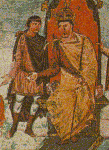Charles II.
|
 |
born June 13, 823
died Oct. 6, 877, Brides-les-Bain, France
byname Charles the Bald, French Charles le Chauve, German Karl der Kahle
King of France (i.e., Francia Occidentalis, the West Frankish kingdom) from 843 to 877 and Western emperor from 875 to 877. (He is reckoned as Charles II both of the Holy Roman Empire and of France.)
Son of the emperor Louis I. (778-840) the Pious and his second wife, Judith, Charles was the unwitting cause of violent discord when, in 829, he was granted lands by his father; Louis's action precipitated a series of civil wars, lasting until 838, in which the three sons of his first marriage, Lothair I. (795-855), Louis II the German, and Pippin I, strove to maintain or to increase the rights that they had been guaranteed by the succession settlement of 817, the Ordinatio imperii. Pippin died in 838, but after the death of Louis I in 840 the civil war resumed and continued until Louis the German joined with Charles to force Lothair to accept the Treaty of Verdun in 843, by which Charles received all the lands west of a line roughly following the Scheldt, Meuse, and Saône rivers, the eastern mountains of the Massif Central, and the lower reaches of the Rhône River, and Louis the German and Lothair received respectively the lands of the East Franks (Germany) and the middle kingdom, lying between the other two.
Until 864 Charles's political situation was precarious because few vassals were loyal to him. His lands suffered from raids by Northmen, who left only after receiving bribes; he was defeated by the Bretons and, in 858, faced an invasion by Louis the German. Yet he succeeded in gaining control of Aquitaine after the capture of Pippin's son in 864; and, by the Treaty of Meersen (870) with Louis the German, he received western Lorraine.
When Lothair's eldest son, the emperor Louis II, died in 875, Charles went to Italy and was crowned emperor on December 25 by Pope John VIII. In 876, after the death of Louis the German, Charles invaded Louis's possessions but was defeated at Andernach by Louis's son, Louis III the Younger. Charles's death in the next year occurred when another son of Louis the German, Carloman, was marching against him and when his own major vassals were in revolt.
During Charles's reign some of the splendours of the Carolingian renaissance were revived, and his close collaboration with the church enhanced his prestige and authority.
Copyright © 1994-2002 Encyclopædia Britannica, Inc.
![]()
Sources
- Encylopedia Britannica 2002, Expanded Edition DVD
Web





